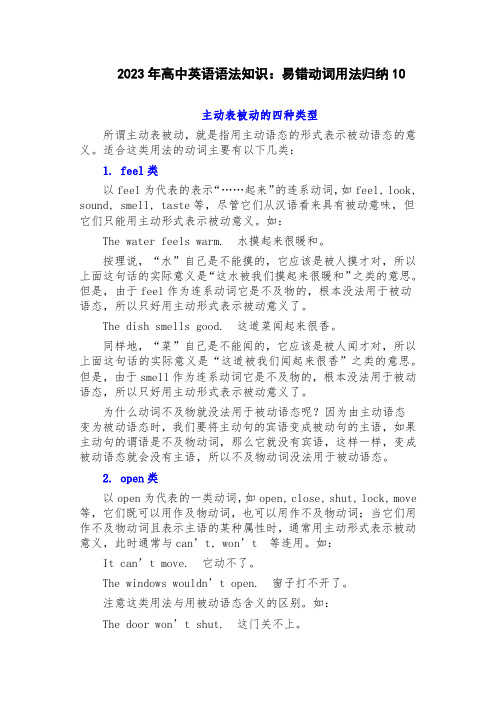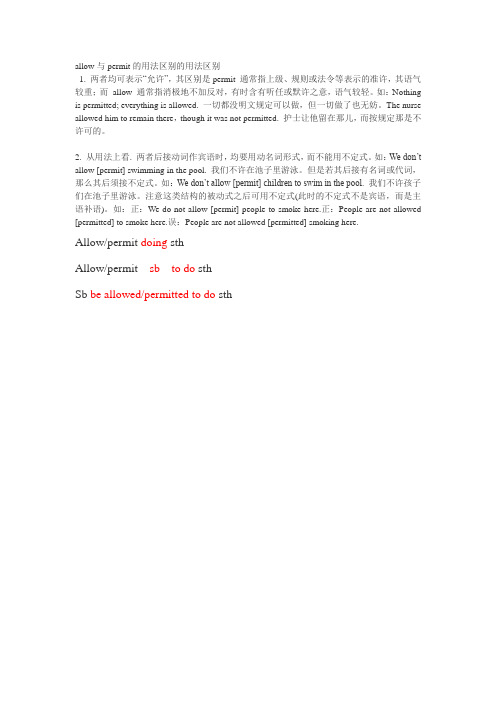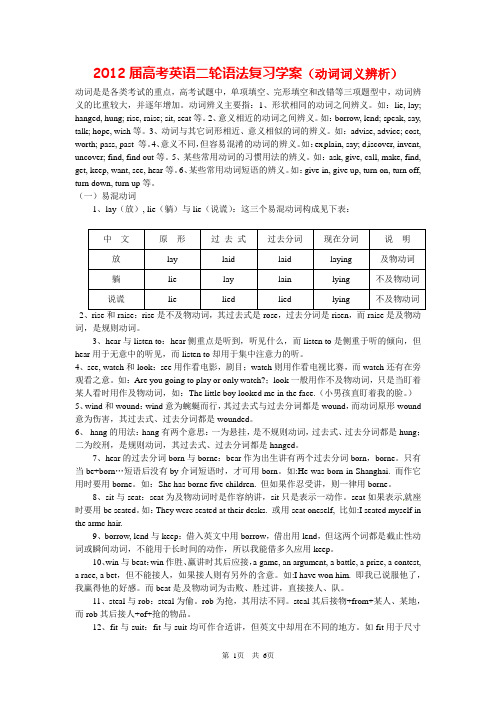高考重点英语语法之allow与permit的运用
高考英语语法复习要点 (分词 动名词 状语从句)

分词要点1.have sb do =make sb do : have me do the jobhave sb doing : have me waiting for hourshave sth done: 被动关系have my bike repairedhave trouble/difficulty (in) doing / have a hard time (in) doingwon’t have sb doing: 决不允许I won’t have you cheating2.get sb to do: get the worker to fix the machineget sth doing: get the car goingget sth done: get the car startedget done get caught/ promoted/paid3.make sb do: make me waitmake sb/sth done make oneself understood/ make my view known 4.keep sb/sth doing keep me waitingkeep sb/sth done keep me informed of the newskeep sb/sth from doing keep me from waiting5.leave sb/sth doing leave me thinking/wonderingleave sb/sth done leave the job unfinished6.set sb doing set us laughing7.start sb/sth doing start us thinking8.send sb/sth doing send us wondering9.want sb to do want me to help himwant sth (to be ) done want the job ( to be ) done10 wish sb to do wish you to winwish sth ( to be ) done wish myself told the truth11. catch sb doing 当场抓住某人做…12.remain standing/sitting/ thinking 仍然remain seated/ untouched/ unfinished仍然remain to be solved/ discovered/ found 有待(被动式)13udging from …, 从判断Speaking of/ Talking of /Thinking of….,谈及Considering….,鉴于/考虑到Generally speaking/ 大体而言Frankly speaking坦白而言14with结构,He came in, with a girl standing beside him., with his hands tied., with a gun in his hand., gun in hand(没有a,没有one’s), with no shoes on., with the door open.(with the door closed/ shut)With a lot of work to do, I stayed at the company.15The accident that happened yesterday was horrible. 正确(不能用happening做定语,ing分词表示正在进行)The accident happened yesterday was horrible.错误,因为有两个谓语There is a car coming.16This is the best film ever made. ( 不用having been made)注意:having done/ having been done/not having done/ not having been done 不能做定语,只能做状语!!!!17I went home, only to see my house broken into. 我到家却发现房子被人闯入过了。
2025中职高考英语一轮复习非谓语动词 考点突破

动词不定式
1、基本形式: ① to+动词原形(to do); 例 :I need to drink some hot water. 我需要喝一些热水 ② 省略to的不定式 My brother always makes me laugh. 我哥哥总是使我大笑。 He lets me help him. 他让我帮助他
动名词
1. 基本形式:是在动词末尾加 -ing 形式构成,因此又叫动词的 -ing 形式。如: do-doing, be-being, ask-asking … 例:Traveling by ship is comfortable. 乘船旅行很舒服
2.特点:① 动名词不能作谓语,不受人称和数的影响;
② 介词后的动词要用动名词形式; 例:Without working hard, no one can succeed in life.
不努力工作,没有人能成功
③ 动词放句首用动名词形式; 例:Doing sports is healthy. 做运动是健康的
动名词的用法
1.作宾语 —— 考动词的固定搭配 【重点考察】 ① 常见的谓语动词后跟动名词作宾语(表示“做...”这件事):
E、感官动词:see、watch、notice、hear、observe、feel等表(不定 式表示动作的整个过程,并已结束) We often hear her sing the song at home. 注: 感官动词后的不定式均不带to
1.The teacher asked us ____ so much noise(吵闹声).
B、表要求命令的动词:ask、tell、request、 order、warn等 The chairman requested the members to be silent. 主席命令成员们保持肃静 固定搭配:ask/tell request... sb. to do sth. 要求/命令某人做某事
2023届高考英语语法知识:易错动词用法归纳10讲义

2023年高中英语语法知识:易错动词用法归纳10主动表被动的四种类型所谓主动表被动,就是指用主动语态的形式表示被动语态的意义。
适合这类用法的动词主要有以下几类:1. feel类以feel为代表的表示“……起来”的连系动词,如feel, look, sound, smell, taste等,尽管它们从汉语看来具有被动意味,但它们只能用主动形式表示被动意义。
如:The water feels warm. 水摸起来很暖和。
按理说,“水”自己是不能摸的,它应该是被人摸才对,所以上面这句话的实际意义是“这水被我们摸起来很暖和”之类的意思。
但是,由于feel作为连系动词它是不及物的,根本没法用于被动语态,所以只好用主动形式表示被动意义了。
The dish smells good. 这道菜闻起来很香。
同样地,“菜”自己是不能闻的,它应该是被人闻才对,所以上面这句话的实际意义是“这道被我们闻起来很香”之类的意思。
但是,由于smell作为连系动词它是不及物的,根本没法用于被动语态,所以只好用主动形式表示被动意义了。
为什么动词不及物就没法用于被动语态呢?因为由主动语态变为被动语态时,我们要将主动句的宾语变成被动句的主语,如果主动句的谓语是不及物动词,那么它就没有宾语,这样一样,变成被动语态就会没有主语,所以不及物动词没法用于被动语态。
2. open类以open为代表的一类动词,如open, close, shut, lock, move 等,它们既可以用作及物动词,也可以用作不及物动词;当它们用作不及物动词且表示主语的某种属性时,通常用主动形式表示被动意义,此时通常与can’t, won’t 等连用。
如:It can’t move. 它动不了。
The windows wouldn’t open. 窗子打不开了。
注意这类用法与用被动语态含义的区别。
如:The door won’t shut. 这门关不上。
The door won’t be shut. 这门将不用关上。
allow与permit的用法区别的用法区别

allow与permit的用法区别的用法区别
1. 两者均可表示“允许”,其区别是permit 通常指上级、规则或法令等表示的准许,其语气较重;而allow 通常指消极地不加反对,有时含有听任或默许之意,语气较轻。
如:Nothing is permitted; everything is allowed. 一切都没明文规定可以做,但一切做了也无妨。
The nurse allowed him to remain there,though it was not permitted. 护士让他留在那儿,而按规定那是不许可的。
2. 从用法上看. 两者后接动词作宾语时,均要用动名词形式,而不能用不定式。
如:We don’t allow [permit] swimming in the pool. 我们不许在池子里游泳。
但是若其后接有名词或代词,那么其后须接不定式。
如:We don’t allow [permit] children to swim in the pool. 我们不许孩子们在池子里游泳。
注意这类结构的被动式之后可用不定式(此时的不定式不是宾语,而是主语补语)。
如:正:We do not allow [permit] people to smoke here.正:People are not allowed [permitted] to smoke here.误:People are not allowed [permitted] smoking here.
Allow/permit doing sth
Allow/permit sb to do sth
Sb be allowed/permitted to do sth。
非谓语动词高考英语专题讲解 非谓语动词高考考点及近四年配套真题

非谓语动词非谓语动词是高考的重点和热点,非谓语动词分为三种形式:不定式,V-ing分词(又分为现在分词和动名词)和过去分词。
注:常见作独立成分的非谓语动词to tell you the truth(实话说),needless to say(不用说),to be honest/frank(老实说,坦白说),to be more exact(更确切地说),to make things worse (更糟的是),not to mention…(更不用说),Generally / Frankly / Roughly speaking (一般说来 / 坦白说 / 粗略地说)(一)辨别谓语与非谓语特别注意分析句子的结构才能辨别谓语与非谓语。
①The traffic rule says young children under the age of four and __ less than 40 poundsmust be in a child safety seat.A. being weighedB. weighsC. weighedD. weighing【解析】容易误选B或C,将其当成谓语看待。
under the age of four and ____ less than40 pounds用作children的定语。
动词weigh与名词children是主动关系,所以选择weighing。
②______ blood if you can and many lives will be saved.A. GivingB. GiveC. GivenD. To give【解析】如果不注意分析句子结构,会误选A或C项。
这是祈使句+and+陈述句的句型。
答案B。
(二)非谓语作主语、宾语的重点1.it充当动词不定式的形式主语或形式宾语①It is important for us to learn English very well.对我们来说学好英语是非常重要的。
高中英语语法填空之非谓语动词作状语和补语

语法填空之非谓语动词作状语和补语1.分析逻辑关系(1)作状语:①表目的、出乎意料的结果或在形容词后作状语,用不定式;②表伴随、时间或条件等要用现在分词/过去分词;③表自然而然的结果用现在分词。
(2)作补语:根据具体结构用(to) do/doing/done①如逻辑主语与非谓语动词之间是主谓关系,且表正在进行,用doing。
②如逻辑主语与非谓语动词之间是被动关系,且表完成,用done。
2.牢记5种用法①不定式作宾补:allow、ask、beg、command、encourage、expect、forbid、invite、persuade、tell等+sb. to do sth.。
②用省略to的不定式作宾补的动词:“五”看;“三”使;“两”听;“一”感觉。
“look at/see/watch/notice/observe; make/let/have; hear/listen to; feel”+sb.+do sth.。
注意:但在被动语态中作主语补足语要还原to,如be_made_to_do。
③have sb./sth.doing “让某人/某物一直做”;have sb./sth.done “让某人/某物被做”。
④主语+系动词+形容词(easy、hard、impossible、important等)+to do⑤too+adj./adv.+to do或adj./adv.+enough+to do3.固定句型识记不定式作补语:advise sb. to do allow sb. to do ask sb. to dobeg sb. to do cause sb. to do encourage sb. to do expect sb. to do forbid sb. to do force sb. to do help sb. (to) do invite sb. to do inspire sb. to do order sb. to do permit sb. to dopersuade sb. to dorequire sb. to doremind sb.to dotell sb. to dowant sb. to dowarn sb. to dowish sb. to dowait for sb. to docall on sb. to do 号召某人去做rely on sb. to do 指望某人做某事-ing 作补语catch sb. doing 发现、撞见某人做某事find sb. doing 发现某人做某事keep sb./sth. doing 使...处于...状态leave sb./sth doing 使...处于...状态课堂练习1.On the last day of our week-long stay, we were invited to attend a private concert on a beautiful farm on the North Shore under the stars, ________ (listen) to musicians and meeting interesting locals.2.You don't have to run fast or for long________ (see) the benefit.3.The government encourages farmers to grow corn instead of rice________ (improve) water quality.4.Once his message was delivered, he allowed me________ (stay) and watch. 5.They are required________ (process) the food that we eat, to recover from injury and for several other bodily functions.6.Nervously ________ (face) challenges, I know I will whisper to myself the two simple words “Be yourself”.7 ________ (enjoy)the convenience of digital payment, many senior citizens started to use smart phones.8.Ordinary soap,________ (use) correctly, can deal with bacteria effectively. 9.I need a new passport so I will have to have my photographs________ (take).10.People probably cooked their food in large pots, ________ (use) twigs (树枝) to remove it.课后练习Gabi Rizea only discovered his talent for woodcarving three years ago,and has since put 1to good use,saving dozens of old tree stumps (树桩) from 2 (remove) by turning them into impressive works of art.Rizea became a woodcarver 3(complete) by accident.Three years ago,after buying himself a new chainsaw(链锯),he 4(start) “playing” with it on a block of wood.He tried carving a human face into the wood,and to his surprise,it turned out pretty good.Today,he is so good at woodcarving that his home city allows him to workhis magic on old tree stumps and so far about 40 works of art 5(create) in the local parks.“In 99% of the cases,the wood just doesn’t match my ideas,” he said in an interview.“I first have to remove all the rotten parts,and sometimes,6is left isn’t enough for my designs.”Following his recent rise to fame,Rizea has been asked by many 7 (city),including the capital of Romania to transform their old tree trunks 8 works of art.He promises to honor their requests,but he will never repeat any of the artworks 9(find) in his home city.In spite of his obvious talent,the Romanian 10(art) recently got into an art school in order to fully master woodcarving.参考答案:1.it 2.being pletely4.started5.have been created6.what7.cities8.into9.found10.artist课后练习(二)How would you feel if you woke up and found your information in the computer—including your photos,your recent documents—no longer 1 (access)?What if you found out that they had been wiped from your computer, 2 (leave) you with nothing but heartache?Guess what?It happens to people every single day.Every day,people across the country head into their local Apple store in 3(tear),broken computer in hand,praying as they wait in line 4an expensive repair might,just might,recover the priceless,irreplaceable files.A few get lucky. 5for the rest,there’s nothing anyone can do 6(help).Hasn’t it happened to you?If your computer remains unprotected,it will,and it’s only 7matter of time.But thanks to recent breakthroughs in computer backup(备份) technology,you now have a number of options to choose from,and if you’re smart,when your computer 8(crash),you shouldn’t have any trouble 9(get) 100% of your files back that same day.I’m not talking about an external hard drive.I’m talking about an online backup solution that runs 10(quiet) inthe background on your computer.If you have one installed (安装),when your computer crashes,you’ll be just one click away from bringing your files back to life.参考答案:1.accessible2.leaving3.tears4.that5.But6.to help7.a8.crashes9.getting10.quietly。
高考英语复习第一部分语法知识及运用专题非谓语动词考点三非谓语动词作宾语、表语、主语和补语课件

专题5 非谓语动词
考点三 非谓语动词作宾语、表语、主语 和补语
撬点·基础点 重难点
基础点 1 非谓语动词(不定式、动名词)作宾语 (1)下列动词一般用不定式作宾语 decide/determine, learn, want, expect/hope/wish, refuse, manage, care, pretend, offer, promise, choose, plan, agree, ask/beg, help。
sth.试着做某事
to do sth.打算做某事
mean doing
sth.意味着做某事
to do sth.继续做另外一件事 go ondoing sth.不停地做某事
to do sth.记着去做某事未做
remember doing
sth.记得做过某事已做
to do sth.不能帮助做某事
can't
sb. to do sth. allow/permit/forbid/advise/considerdoing sth. Smoking is forbidden here so we don't allow_you_to_smoke. 这里禁止吸烟,所以我们不允许你吸烟。
We don't allow_smoking in the hall. 我们不准有人在大厅内吸烟。
done看见……被做……
辑上的被动关系
①I heard_her_sing an English song just now. 刚才我听见她唱了一首英文歌。(主动,完成) ②I heard_her_singing an English song when I passed by her room yesterday. 昨天经过她房间时,我听见她正在唱一首英文歌。(主动,正在进行) ③I heard_an_English_song_being_sung by the little girl when I passed by her room yesterday. 昨天经过她房间时,我听见那个小女孩正在唱一首英文歌。(被动,正在进行)
高考高考英语语法复习精品学案之动词词义辨析篇

2012届高考英语二轮语法复习学案(动词词义辨析)动词是是各类考试的重点,高考试题中,单项填空、完形填空和改错等三项题型中,动词辨义的比重较大,并逐年增加。
动词辨义主要指:1、形状相同的动词之间辨义。
如:lie, lay; hanged, hung; rise, raise; sit, seat等。
2、意义相近的动词之间辨义。
如:borrow, lend; speak, say, talk; hope, wish等。
3、动词与其它词形相近、意义相似的词的辨义。
如:advise, advice; cost, worth; pass, past 等。
4、意义不同,但容易混淆的动词的辨义。
如:ex plain, say; d iscover, invent, uncover; find, find out等。
5、某些常用动词的习惯用法的辨义。
如:ask, give, call, make, find, get, keep, want, see, hear等。
6、某些常用动词短语的辨义。
如:give in, give up, turn on, turn off, turn down, turn up等。
(一)易混动词1、lay(放), lie(躺)与lie(说谎):这三个易混动词构成见下表:2、rise和raise:rise是不及物动词,其过去式是rose,过去分词是risen,而raise是及物动词,是规则动词。
3、hear与listen to:hear侧重点是听到,听见什么,而listen to是侧重于听的倾向,但hear用于无意中的听见,而listen to却用于集中注意力的听。
4、see, watch和look:see用作看电影,剧目;watch则用作看电视比赛,而watch还有在旁观看之意。
如:Are you going to play or only watch?;look一般用作不及物动词,只是当盯着某人看时用作及物动词,如:The little boy looked me in the face.(小男孩直盯着我的脸。
- 1、下载文档前请自行甄别文档内容的完整性,平台不提供额外的编辑、内容补充、找答案等附加服务。
- 2、"仅部分预览"的文档,不可在线预览部分如存在完整性等问题,可反馈申请退款(可完整预览的文档不适用该条件!)。
- 3、如文档侵犯您的权益,请联系客服反馈,我们会尽快为您处理(人工客服工作时间:9:00-18:30)。
高考重点英语语法之allow与permit的运
用
he rules of the club do not permit smoking. 这个俱乐部规定不准吸烟。
They shouldn’t allow parking here; the street is too narrow. 这儿不该允许停车,马路太窄了。
我们不许在池子里游泳。
正:We don’t allow swimming in the pool.
误:We don’t allow to swim i n the pool.
但是,它们虽然不能直接跟不定式作宾语,但可跟不定式的复合结构作宾语。
如:
We don’t allow [permit] students to eat in the classrooms. 我们不允许学生在教室吃饭。
两者均可后接双宾语。
如:
We allow passengers one item of hand luggage each. 我们允许每个乘客带一件手提行李。
As it was such a special occasion, she permitted herself a small glass of champagne. 由于那是一个很特别的场合,所以她。
两者均不能后接that引导的宾语从句。
如:
我们不允许人们在大教室抽烟。
误:We don’t all [permit] that people smoke in the lecture room.
正:We don’t allow [permit] people to smoke in the lecture room.
allow与allow的几点区别:
(1) permit 通常指上级、规则或法令等表示的准许,其语气较重;而allow 通常指消极地不加反对,有时含有听任或默许之意,语气较轻:The nurse allowed him to remain there,though it was not permitted. 护士让他留在那儿,而按规定那是不许可的。
(2) permit可用于带形式主语it的被动结构,但allow不行。
如:
It is not permitted to smoke in the kitchen. 厨房内不准吸烟。
